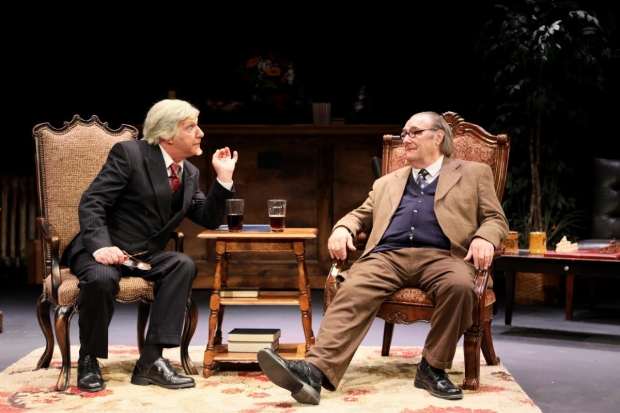Lewis and Tolkien: Of Wardrobes and Rings Grasps at a Mythical Bromance
Playwright David Payne unpacks the friendship between fantasy trailblazers C.S. Lewis and J.R.R. Tolkien.

(photo provided by Keith Sherman & Associates Public Relations)
C.S. Lewis and J.R.R. Tolkien are the creators of Narnia and Middle Earth, inventors of mythologies and languages, conjurers of adventures and fabulations. But playwright David Payne — author and costar of Lewis and Tolkien: Of Wardrobes and Rings, now running in the Sheen Center's Black Box Theater — would like us to remember these men as much for their legendary friendship as their legendary fantasies.
"Where would we be without friends?" opens Tolkien (played by Gordon Tett with mincing British austerity). "Some make a modest impact on one's life and some an impact so profound that you know you would not be the person you are now without that friendship." It's a speech that anticipates a love to rival Glinda and Elphaba, but like the actors re-creating the images of Lewis and Tolkien, those lofty expectations sink into a pair of well-upholstered armchairs and never rise again.
Marc Whitmore stagnantly directs what is framed as the very last meeting between Lewis and Tolkien, though the authors don't know this will be their final visit to Oxford's Eagle and Child pub, or their last chance to be greeted by their favorite ditsy American barmaid, Hattie (Audrey Ney doing her best Miss Adelaide as the clumsily crafted and insignificant third character). Lewis (Payne balancing Tett's over-the-top performance with a less affected version of "Jack," as Tolkien calls him) has recently resigned his post at Cambridge University following a heart attack, and we're led to believe that he and Tolkien (or "Tollers") haven't spoken much of late — an almost-regret that Tolkien rectifies with this eleventh-hour reunion.
The following two acts (divided by an offstage lunch, which has no business dividing the 95-minute play into two parts) consist of reminiscences that fill in biographical blanks far more than they develop character. As the literary giants sit in their adjacent chairs (surrounded by Gregory Brown's untouched scenic elements), we hear Tolkien's thoughts on the "True Myth" of Christ (the argument that famously helped solidify Lewis's Christian beliefs); Lewis's summary of his marriage to Joy Davidman and her tragic death, his reflections on which are poignantly captured in his book A Grief Observed; and the inspirations for both The Chronicles of Narnia and The Lord of the Rings, including vows that neither would ever be made into films (wink, wink). We leave with an informative synopsis of key facts and a list of suggested further reading, but a spoken Wikipedia article does not a play make.
Even without a traditional plot to unfold, we need an emotional arc to follow — especially when the stated premise is a portrayal of one of the most profound friendships in literary history. The men spend some time unemotionally working through their disagreement over Lewis's marriage, which Tolkien believed was not valid in the eyes of God (Davidman had been married before), and they end with an analytical discussion on male friendship. "Indeed, I think it's sad that these days that some people look at strong male friendship in a rather jaundiced way — as though there's something unhealthy about a man expressing love for another man," says Lewis. Perhaps these are not men who would ever set aside intellect to make room for pure emotion, but it would be nice to at least sense that something as mythical as their stories forged this holy bromance.







